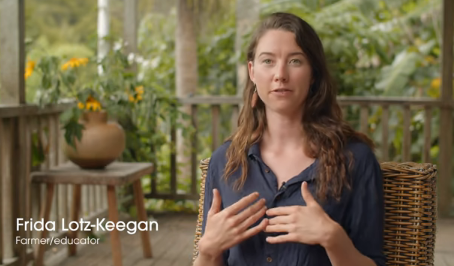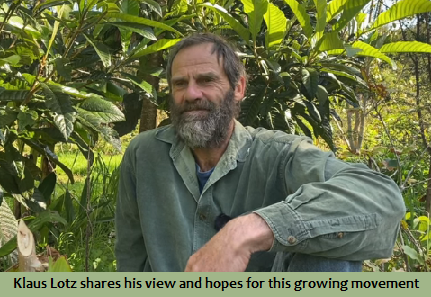Essays Contents
Syntropic Agroforestry
June 27, 2023
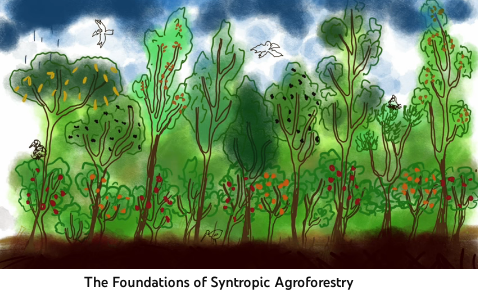
"the ONLY Food Forest video you need to watch in 2023"
video
YouTube channel "Byron Grows"
interesting information
video
YouTube channel "Byron Grows"
interesting information
As I was watching this video...
being a little overwhelmed by new information... new words...
Byron finally explains what some of these new terms mean...
succession... pioneer... chop & drop plants... etc...
and... mistakes he made when he started his food forest...
and he advised...
"start in blocks that are manageable for you
as you sharpen your skills and see how plants react together"...
and Byron has a degree in Environmental Science...
... as I was watching the video...
I was reminded of something that I learned many years ago...
after watching a janitor carefully sweep a floor in a warehouse...
____________ there is a skill to everything. ____________
Even if you would never have any intention of being a janitor...
someday you may be supervising a business...
and knowing the proper method of tasks like sweeping a floor
helps you do that supervising.
Mono-crop Agriculture eventually kills the soil.
Iraq used to be the garden of the Mideast...
until... after about 200 years... the soil was so depleted
that it became a dry and useless desert.
We have done that to farmlands around the world.
We have reached our 200 year mark... in America.
It is vital to our lives that we stop leeching and killing the soil...
and develop better food-farming systems.
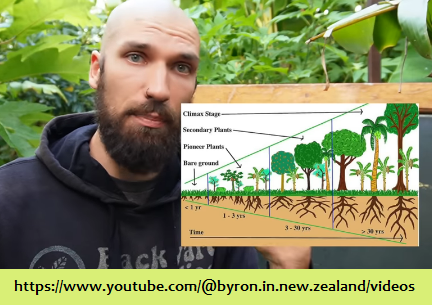
Byron advises new gardeners... take small bites at first...
as you learn your garden and make your choices of plants.
He eventually explains the terms he's using... be patient...
(I feel much better about it now.)
Some people are building forests in their back yards...!
Syntropic Agroforestry takes Permaculture to another level.
It was developed by a Swiss man named Ernst Gotsch
who studied plant genetics among other scientists.
Ernst left the lab and went out on his own to work his own land.
He used intensive pruning (chop & drop) to build carbon in soil.
He planted in orderly rows... rather than merely scattering seeds.
This allowed work space... and a place to discard pruned folliage.
He considered the garden as it was now...
and as it would be in 30 years.
Many things were part of the puzzle of a garden...
sunlight, shade, or frost tolerance, roots, maturing times...
and growing plants just for the carbon value when chopped.
Other gardeners began using his techniques.
@18:05 Frida describes their farm
"Syntropic agroforestry is a philosophy that incorporates specific practices
and techniques that can be applied in any region, in any climate.
The details in which what species and what plants and what soil you have,
they're all details that determine the different plants that you work with.
But the principles and practices of syntropic agroforestry is limitless in
climate and region."
"The name syntropy doesn't have anything to do
with subtropical.
It works in any climate zone. It's using the natural laws of succession...
plant communities following each other... building up microbial
communities below soil surface. It happens all around us.
We need to actually understand it...
and we need to do that for every climate zone."
"You never copy what a food forest is in one location... to another.
You're always there observing what the existing vegetation is...
what the soil's like... what the climate's like... and also quite important...
what the people are like that will be there to manage it... to live with it."
"So we need to actually train people up fast in that technique...
and do it on all scales possible... in all sorts of variations...
with livestock... without livestock.
And you can turn degraded wasteland around in a very short time.
And we have produced huge amounts of wastelands
all over the world... that's what we have been really good at.
Our responsibility now is to turn exactly those wastelands
back into thriving food forest...
and syntropy is just the best technique for doing that.
And what we need for that is people...
and we have a lot of people...
It's a great way to get connected to an ecosystem and feel part of it."
"We really see syntropy as a way of creating a positive story
around humans' role in our ecosystem...
and I think that can do a lot to how we then relate to nature...
as one with nature... and not separate to nature.
We can create human-inclusive ecosystems that we can be a part of."
They call their project... PermaDynamics...
Their channel:
"Syntropy has its own ethics and philosophy, as well... which are,
of course, in parallel to permaculture... and it always points out that
we work on the principles of unconditional love... yeah...
we don't love plants because they are special... because they make us
money... we love them because they are good for the whole system...
and we don't look at them as beets, or something like that... or we
don't look at that plant as being it's a sacred plant because it creates
hallucinations, you know... they're all welcome partners because they
make this system go towards an abundance.
"That's how we look at plants... and again the same with animal pests...
we don't hate them, we see them as agents of change... that need to
bring about a certain shift in vegetation, possibly. We need to understand
and we have to learn from them... just like Ernst learned from the
leaf cutter ants about succession and consortium of plants. Once he
realized that he can't just fight them and hate them... so this is the
principle of unconditional love in syntropy.
"And it's also inspired by Taoism... of entering that flow... that dynamic...
the constant change embracing change... bringing about change...
and also humbling ourselves as humans... that we don't see us as...
I would say... as the stewards. We need to see ourselves as
someone who constantly needs to learn... adapt... understand...
observe... and interact where it is suitable and necessary... right?...
but not impose ourselves... not control... but respect... substitute
control with respect... I think that is crucial.
"And these are spiritual qualities... without making it into a religion...
it's just an ethic that you bring to it... that means if syntropy would be
taken up as an investment scheme by corporations you cannot just
look at it as a technique... it has to be embedded in an ethic like
permaculture.
"So I think that's very important... to keep that in mind...
that it's not just a tool that you program AI on and set it loose on the
landscape... it has to be embedded in an understanding of... the
respect... for life... and us being just a humble part of it.
"So for the future... personally I would like to see more people practicing
it, of course. It should be part of a school curriculum, because it's a
language that everybody needs to know... because that's where our
sustenance comes from... it's from our interaction with plants.
"We cannot expect fossil energy to be there to prop us up with our
inefficient production systems. We have to find better ways... for the
sake of climate... for the sake of depleting resources... for our own
health's sake... and we need more people that have their own experience
so they can teach... and hopefully we can turn that around... and turn
all the wastelands we have created over the last hundreds of years...
turn them around into beautiful paradises... which they can be.
"In any place on Earth we can have a paradise if we apply the language
of syntropy and interact with it in that way... so, yeah... let's get to it...
and... use the beautiful insight that Ernst worked out over years and
years of hard work... always striving for a better understanding...
We need to apply that all around the world... and pass it on...
and carry on finding our own values within it... and finding new ways
within it... as something that is developing... and we need to be
all a part of it.
"So, please, all join in on that... on the journey.
It's very rewarding... it's beautiful... it's productive... and it's satisfying...
and it's heartwarming being part of that. It's beautiful."
From their channel description:
"We are a research farm and education centre. Focused on presenting our permaculture and syntropic agroforestry knowledge and experience to those who want to transform their lives, regenerate soils and inspire creative change.
We have a active online community membership were we release diverse videos on all things permaculture and syntropic agroforestry."
To join and to learn more about us, visit:
email membership

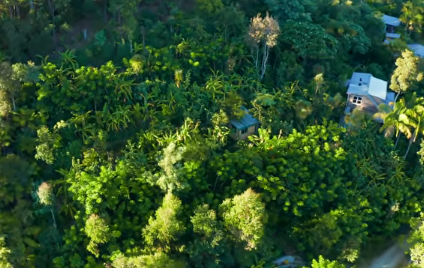
What am I thinking...?
Are our societies suffering from a disconnect from nature...?
... each of us... personally...?
all of us... as a whole...?
Are we relying on pills to solve our health problems...?
Do we realize the contra-indications of those pills...?
yes... every one of those pharmaceuticals has side-effects...
oral antibiotics are one of the worst to cause problems...
like depression... and the destruction of our digestive processes...
Does our lack of fresh, clean air... affect our mental stability...?
so that we now live most of our lives... inside dark rooms...?
staring at a screen and a world of information coming very fast at us...?
Is it natural to live our lives in the fast lane... all day long...?
What is natural... and what is un-natural...?
I suppose natural means... connected to the life of the earth.
And... looking around... what do we see... blooming on earth... but...
much life that is NOT in the natural order of things.
Have we disconnected our lives so far from nature...
so far from the earth that gives us life itself...
that nourishes our human souls...
that teaches us peace and patience... and hope of renewal...
that we are now... showing signs of... blight...?




